Aha! Ideas comes with two plan options. The Aha! Ideas Essentials plan includes everything you need to collect and prioritize feedback from customers, employees, and partners — including custom-branded ideas portals, unlimited portal users, scorecards for ideas, and basic reporting.
The Aha! Ideas Advanced plan is for organizations that want to gain greater insights into customer needs and understand which ideas drive revenue. It includes additional functionality to collect feedback, such as dynamic forms in ideas portals, virtual focus groups, and in-app feedback widgets. Integrate with CRM tools (such as Salesforce and Zendesk) to gather input from customer-facing teams. Then, use the power of AI to explore feedback themes and build sophisticated reports to analyze trends.
All Aha! Ideas trials start on the Aha! Ideas Advanced plan. If you are an Aha! Ideas Essentials or Aha! Roadmaps user, contact us if you would like a live demo of Aha! Ideas Advanced functionality or want to try using anything you see here in your account.
Note:
Aha! Roadmaps accounts created before October 20, 2020, include some Aha! Ideas Advanced functionality (custom ideas portal domains and proxy votes), but will need to upgrade to Aha! Ideas Advanced for any future enhancements.
Aha! Roadmaps accounts created before August 31, 2021, include the Aha! Ideas Advanced integrations with Salesforce and Zendesk, but will need to upgrade to Aha! Ideas Advanced for any future enhancements.
Click any of the following links to skip ahead:
Gather feedback at scale
Salesforce integration
Give customer-facing teams a convenient way to capture requests and keep customers informed of status changes. Sync account data in Salesforce with organizations in Aha! Ideas so that you can better understand an idea's revenue potential and the customer behind it.
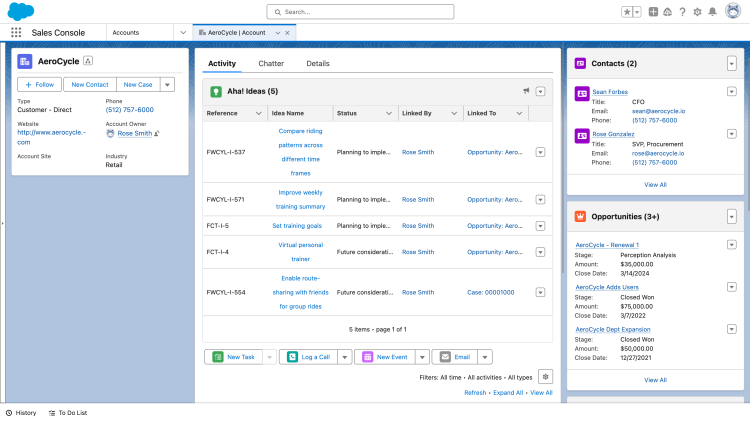
Use the Salesforce opportunity report to gain the insights you need to prioritize revenue-driving ideas.
Read more about the Salesforce integration.
Zendesk integration
Capture customer feedback without leaving your support tool. Support teams can search through your ideas portal directly from Zendesk to add a vote to an existing idea or create a new one. Analyze ideas submitted from Zendesk to better understand the problems your customers need to solve.
Read more about the Zendesk integration.
Proxy votes
Sometimes, your best ideas do not come directly from customers. They come indirectly from customer-facing teammates. Sales and support teams can vote for an idea on behalf of a customer using proxy votes and include details about the opportunity. You can report on proxy votes as well as votes received through Salesforce and Zendesk integrations.
Your customer-facing teammates can follow the ideas your customers value the most — they will receive notifications for updates to any ideas they update with a proxy vote. Your portal users can also see all proxy votes for any organization, giving them context about which ideas are most important to a customer before meeting with them.
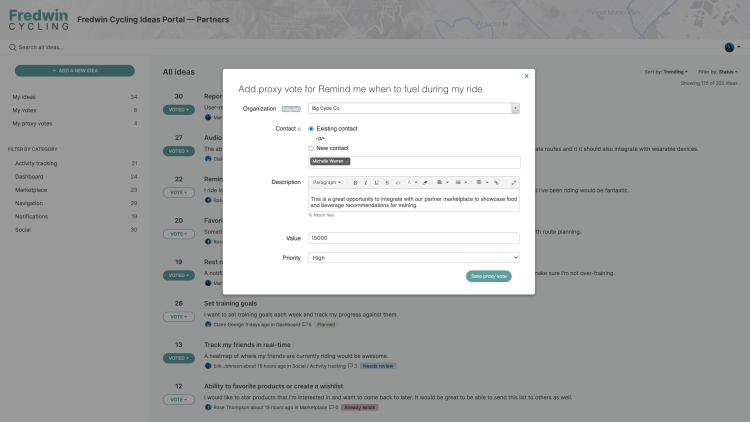
Read more about using proxy votes or integrating with Salesforce or Zendesk.
Dynamic idea submission forms
When you collect feedback from your customers, you want to make sure to capture key information. With dynamic idea submission forms, you can present the most relevant questions to users as they move through the idea submission process. Add as many steps as you need to the Ideas portal — Ideas layout that customers use to submit feedback. Then, create conditional rules — defining what you want to happen when they complete a field with a specific value. Show or skip specific steps, have users submit their idea, or display a custom message.
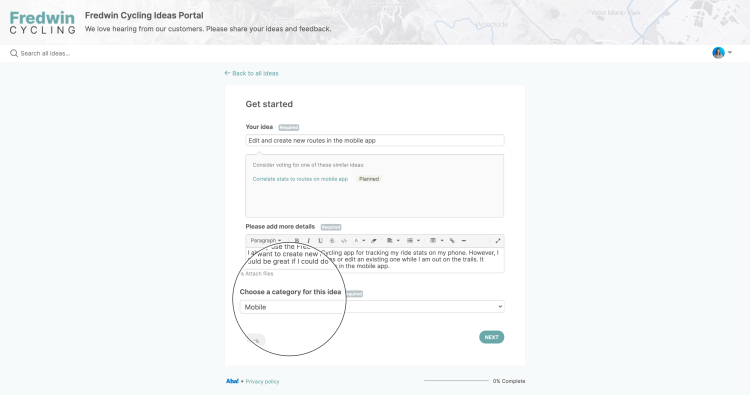
Read more about creating dynamic forms.
Automation rules
Create rules to streamline processes so you can spend more time prioritizing feedback, engaging with users, and uncovering innovative ideas. Use automation rules to assign ideas to the right team member to keep momentum going, saving you a manual triage step. You can even create to-dos, post admin responses to ideas in your portal, and much more.
Read more about automation rules and view more examples.
Create compelling portals
Custom pages
Create a roadmap or note with information you want to share with your portal community and add it to a custom page. Because ideas portals are a great place to gather feedback, adding a custom page with your plans and insights allows your organization to proactively share what is next — giving your customers or internal teams the opportunity to weigh in on what is coming. Add as many custom pages as you need and cater your roadmap or insights to the people visiting your portal.
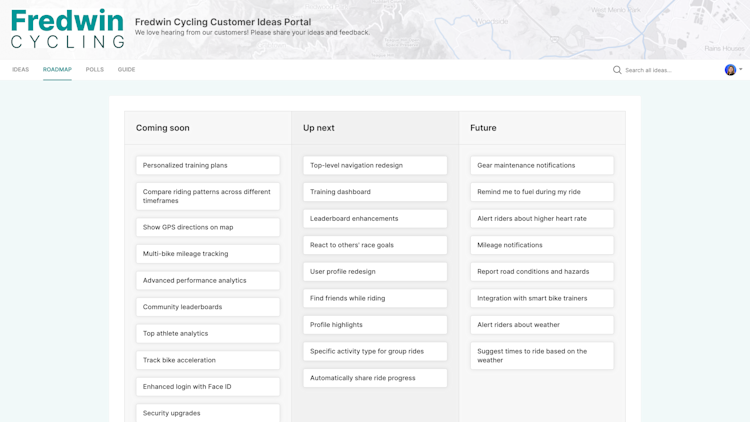
You can even create a wiki in your workspace documents and publish it on a custom page in your ideas portal. This enables your customers to view helpful content in the same place where they leave product feedback.
Ideas portal language settings
Ideas portals give your customers a voice — so it makes sense that your ideas portals should be in the language your customers are most comfortable with. Thanks to portal-specific language settings, your ideas portal will automatically detect the user's browser setting and display standard text in one of five languages (English, Spanish, German, French, or Dutch) to capture insights from more of your users.
Read more about using translation for ideas portals.
Custom ideas portal domains
Give your ideas portal a custom URL that aligns with your company's domain to ensure a consistent customer experience. In Aha! Ideas Essentials, your ideas portal URL is in this format: yourname.ideas.aha.io (for example, our ideas portal is big.ideas.aha.io). With Aha! Ideas Advanced, you can completely customize the URL itself to match your company's URL.
Read more about creating a custom ideas portal domain.
Shared SSO configurations
Single sign-on (SSO) makes it easy for people to log in and submit ideas — but it can be tough to manage a new SSO configuration in each new ideas portal. With Aha! Ideas Advanced, you can add an identity provider in your Aha! Ideas account settings and use the same configuration for multiple ideas portals. This makes it easier to create new ideas portals without having to set up a unique SSO connection for each one.
Read more about sharing SSO configurations across ideas portals.
Gain deeper understanding
Revenue
Understand your opportunity pipeline. The Salesforce opportunity report combines account data from Salesforce with ideas data to help you see how much opportunity potential is sitting at each stage of development and which product gaps are blocking new deals. Gain insights from the report — then prioritize the ideas that will drive the most revenue.
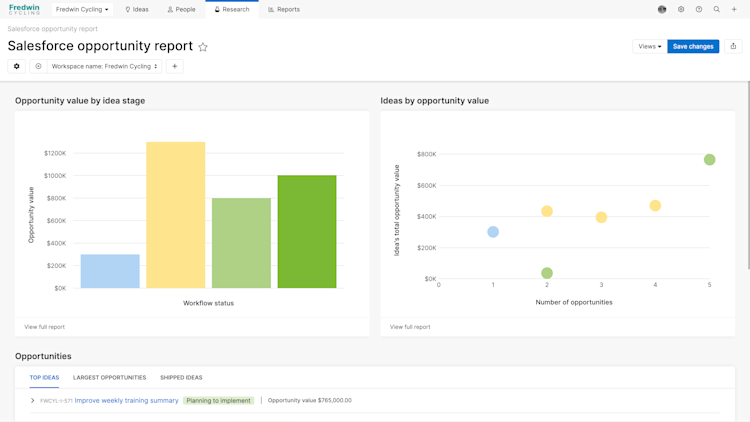
Read more about the Salesforce opportunity report.
Organizations
Organization records give you an unrivaled view into customers' requests. Whether they share feedback directly or through a sales or support team member, you can aggregate everything into one account-level Aha! Ideas record, then customize that record to include custom fields. This helps you capture important information (such as the customer's industry, revenue, and location). Use pre-built reports to track the status of each organization's ideas, see how many organizations are voting for each idea, and understand how customers' priorities align with your own.
Help customers understand their organization's needs by giving them a view of all of the ideas, votes, and comments from other portal users at their organization. Or create an organization-specific ideas portal so your customers can only share and see ideas submitted by their own organization — keeping their ideas private only to their company.
If you have Aha! Roadmaps as part of your Aha! account, you can take advantage of the Organizations custom field. Link your organizations to any record type with custom layouts so you can track key customers on your roadmap plans.
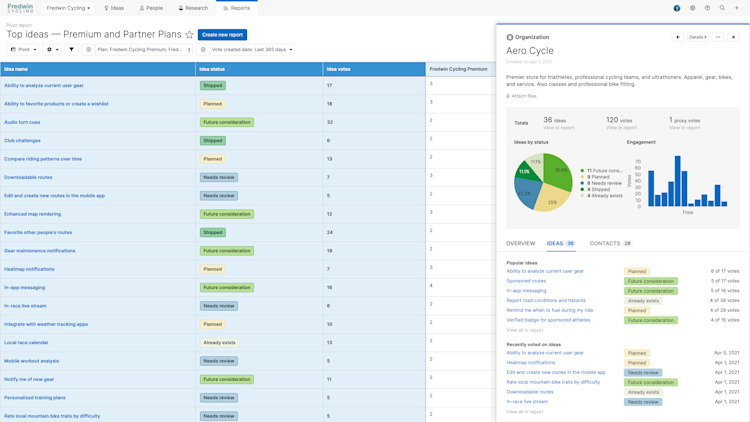
Read more about using organizations.
Segments
Not all of your customers are alike. But you might have feedback trends from companies in specific industries and locations or companies of a certain size. Analyzing ideas by segment can give you a deeper understanding of these similar needs. Define customer segments so you can analyze feedback by different criteria (such as company size, location, and industry). Then, use pre-built reports to analyze their most valuable feedback and requests, or create your own comparative reports to see which segments you are already responding to — and which ones need more love.
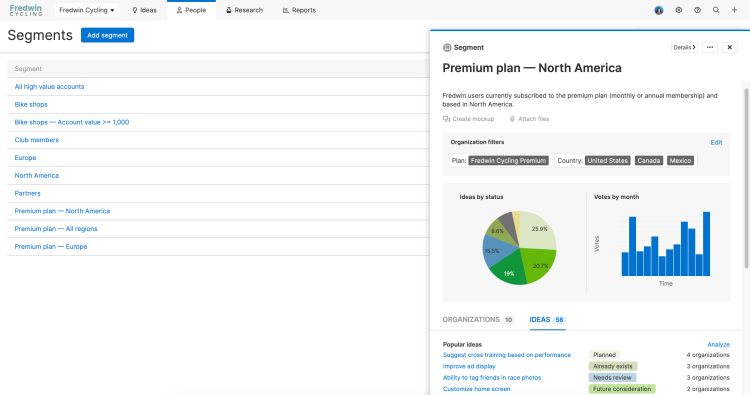
Read more about using segments.
Generate intelligent analysis
AI-powered idea exploration
Staying on top of feedback trends is an important part of idea management. And though you are rarely short on feedback to analyze, you might be short on time. Get an understanding of what type of ideas are trending in your ideas portal without hours of manual work — use the power of generative AI to visualize themes across your ideas. Research ideas for new functionality, explore feedback themes, and find similar requests so you can gain the insights you need to build more lovable products.

Read more about AI-powered idea exploration.
Idea insights
Glean greater context into an idea's popularity with insights, including organization count, total opportunity value, proxy vote count, and ranking within the workspace or category. The information that displays will vary for each idea based on available data. You will also see a list of similar ideas that are popular with the same set of voters.
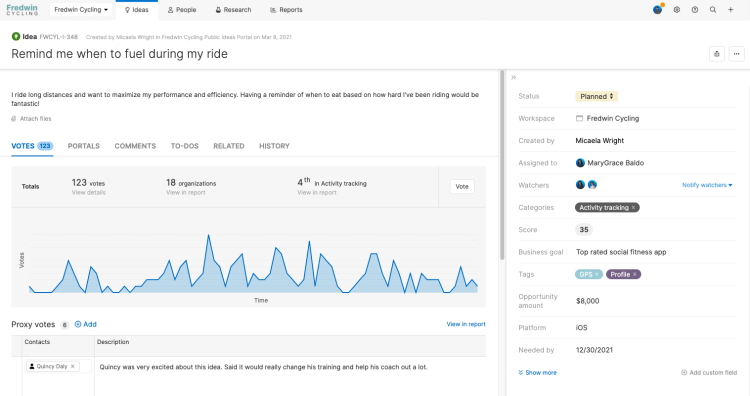
Read more about idea insights.
AI-powered similar idea detection
Use AI-powered similar idea detection to help you manage feedback more efficiently. Quickly spot ideas with potential duplicates, them merge them together to consolidate them — keeping your feedback organized and saving time for more strategic work.

Advanced reporting
If you have a lot of ideas, reporting is key to visualizing trends in your data. With Aha! Ideas Essentials, you can prioritize ideas using the priorities chart and analyze them in a list report. But to dive deeper, you need advanced reporting tools. Aha! Ideas Advanced includes customizable charts and pivot tables to help you highlight insights that you might otherwise miss.
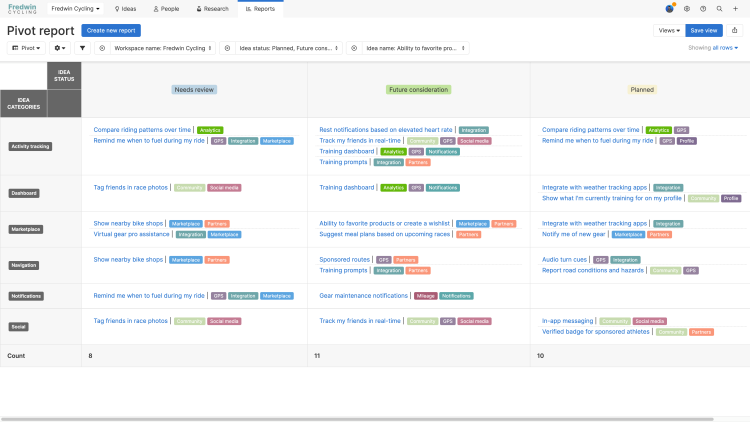
Read more about using charts and pivot tables.
Conduct research
Polls
Research is paramount to understanding what your customers truly need. If you have a great idea you want to implement, ask your customers what they think with a poll. You can launch a multiple-choice poll to get a quick pulse on what your community needs right from your ideas portal.
Add a polls page to your private ideas portal to get insights from your coworkers, or poll your customers on your public ideas portal to find out which features customers are most interested in. Email the poll directly to the ideas' subscribers. Display your poll in-app on a targeted page in your application to get feedback from customers who do not engage with your ideas portal. Then, review poll results on the record's Research tab to make informed decisions about your work.
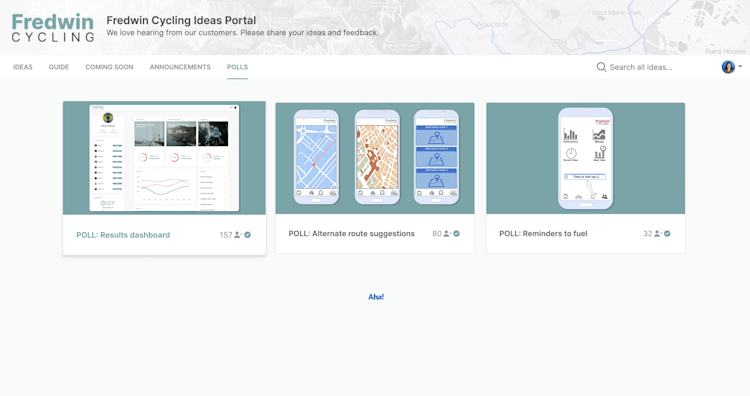
Read more about polls.
Empathy sessions
Empathy sessions are a great way to bring people together for a focused discussion through an online chat-based conversation. You can define a specific topic for your empathy session, such as an upcoming feature or new service. Automatically invite everyone associated with a particular idea (or ideas), then use the threaded conversations and polls to probe deeper into what your customers actually need. After the session, gather the qualitative and quantitative insights and use them to create new ideas or link them to existing ones. Manage empathy sessions as general discussions — or from a record's Research tab — so you can make informed decisions about your work.
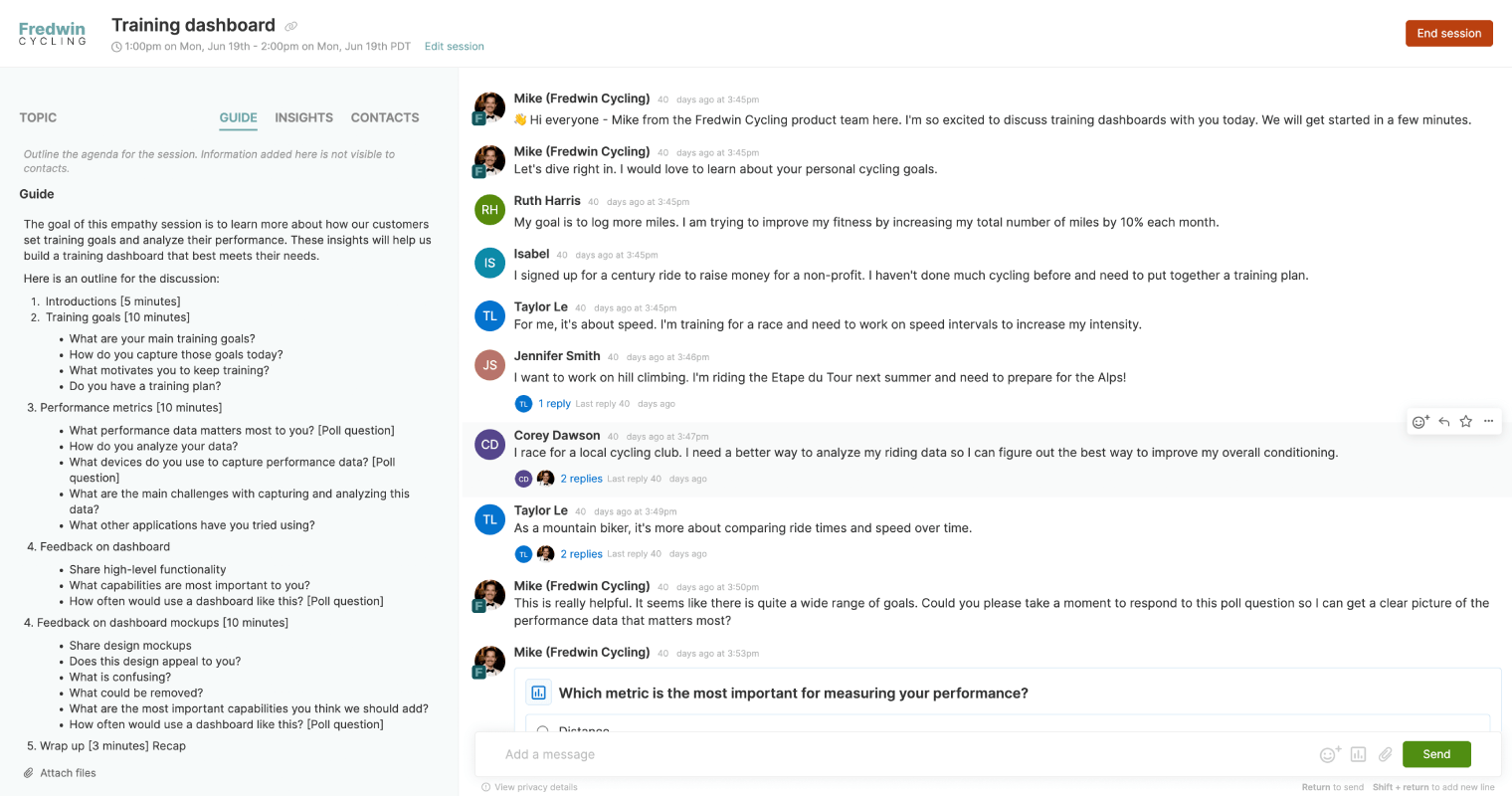
Read more about creating empathy sessions.
In-app feedback
Take feedback collection outside your ideas portal and gather your customers' thoughts and ideas right from your web application. Once you install the code snippet on your application, you can create as many feedback widgets as you would like. Solicit feedback from users about a particular portion of your application. The community-based approach gives users a way to interact directly with your team — as well as with one another. And you get to join the conversation as well.
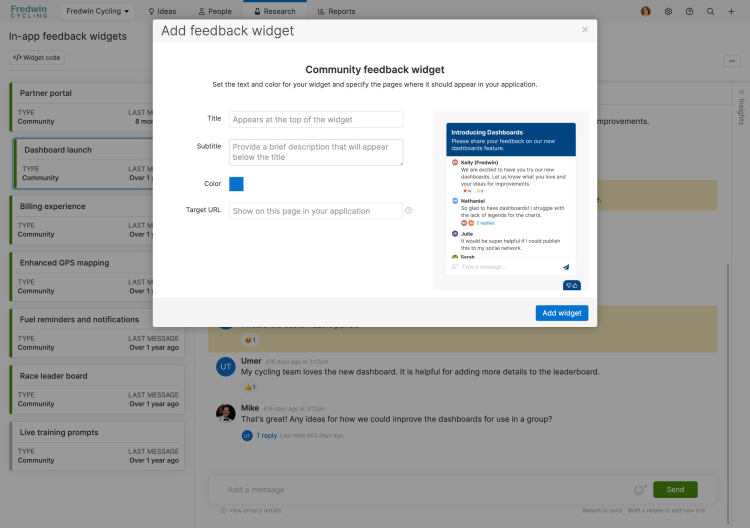
There are three types of in-app feedback widgets:
Use the community feedback widget to discuss feedback with your users in threaded conversations, and then analyze the conversation back in Aha! Ideas to identify future enhancements. Aha! Roadmaps users with the Aha! Ideas Advanced plan can also fold feedback widgets into records' Research tabs to make more informed decisions.
Use the idea submission widget to collect feedback from your users as ideas submitted directly to your ideas portal. Your users never have to leave your application to submit ideas, and you can review their feedback (along with ideas you collect through other channels) in one central location.
Use the polls widget to post a survey directly on your application so you can gather feedback from specific pages and users who will drive strategic decisions.